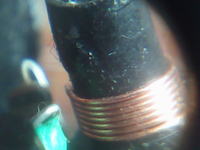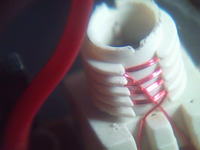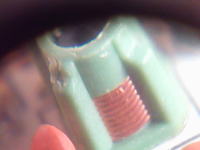DebarghyaChaudhury
Newbie level 6

- Joined
- Jan 8, 2014
- Messages
- 11
- Helped
- 0
- Reputation
- 0
- Reaction score
- 0
- Trophy points
- 1
- Activity points
- 115
Hello,
I am trying to build my physics project for my board exams and basically it is a rc car circuit ,
I have come across this pdf before building the circuit and have taken the ic's from a toy car itself :
https://www.google.co.in/url?sa=t&r..._EYg4eEnX91yq-d8A&sig2=ZZp_5TT-meWkFtzsbTf3oA
but after gathering all the components we could not find the following materials and have used the corresponding replacements :
> Inductor- 6.9uH instead of 6.8uH
>Capacitor- (a) 4.7P instead of 4P
(b) 18.2P(10P & 8.2P in series) instead of 18 P
(c) 470P instead of 501P
>Resistor- 3.2MegaOhms(1MO & 2.2MO) in series instead of 3.9 MO
>KJE 26.6017125 MHz instead of XTAL 27 MHz
also I am not clear about the inductor labelled " 7T 0.3mm(phi) x 5mm (Core)" and the size of the antenna. Please explain these.
I have compiled the whole circuit on a vero board and now it is not working.....it is my 1st electronic project and I am completely at a loss
kindly can anyone point me where I may have gone wrong?
I am trying to build my physics project for my board exams and basically it is a rc car circuit ,
I have come across this pdf before building the circuit and have taken the ic's from a toy car itself :
https://www.google.co.in/url?sa=t&r..._EYg4eEnX91yq-d8A&sig2=ZZp_5TT-meWkFtzsbTf3oA
but after gathering all the components we could not find the following materials and have used the corresponding replacements :
> Inductor- 6.9uH instead of 6.8uH
>Capacitor- (a) 4.7P instead of 4P
(b) 18.2P(10P & 8.2P in series) instead of 18 P
(c) 470P instead of 501P
>Resistor- 3.2MegaOhms(1MO & 2.2MO) in series instead of 3.9 MO
>KJE 26.6017125 MHz instead of XTAL 27 MHz
also I am not clear about the inductor labelled " 7T 0.3mm(phi) x 5mm (Core)" and the size of the antenna. Please explain these.
I have compiled the whole circuit on a vero board and now it is not working.....it is my 1st electronic project and I am completely at a loss
kindly can anyone point me where I may have gone wrong?
Last edited:





